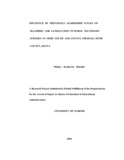| dc.contributor.author | Kimathi, Kenkelvin, M | |
| dc.date.accessioned | 2017-01-10T09:14:51Z | |
| dc.date.available | 2017-01-10T09:14:51Z | |
| dc.date.issued | 2016 | |
| dc.identifier.uri | http://hdl.handle.net/11295/100153 | |
| dc.description.abstract | The purpose of this study was to investigate the influence of principals‟ leadership styles on teachers‟ job satisfaction in public secondary schools in Meru South Sub-County. The objectives of the study included, to establish the influence of principals‟ autocratic, democratic, laissez-faire and transformational leadership style on teacher‟s job satisfaction in public secondary schools in Meru South Sub-County. This study adopted a descriptive survey design where the target population was all 500 teachers and principals in all the 53 public secondary schools in Meru South Sub County. The sample consisted of 33 principals and 100 teachers. The researcher collected questionnaires from 27 principals and 83 teachers from the anticipated 133 respondents representing a questionnaire return rate of 82.7% of the total sample and considerably adequate for analysis. Random sampling was used to select 33 secondary schools from the 53 public secondary schools in Meru South Sub County to participate in the study and to select the teachers of the selected schools. Questionnaires were used to collect data from the respondents. SPSS and Microsoft Excel soft ware were used to analyze the data. From the analysis, the study established that majority of the principals had attended courses, seminars or workshops on educational management facilitated by various players in education. Principals made suggestions for further training in financial management and leadership skills. Other areas included emerging issues in education, administration skills, public relations, performance contracting and basic accounting. On the influence of principals‟ autocratic leadership styles on teachers‟ job satisfaction majority of teachers noted that a small percentage of principals opted for autocratic kind of leadership at the inception of their directives before inculcating other forms of leadership styles in the implementation process of these directives. On the influence of democratic leadership style on teachers‟ job satisfaction; teachers‟ ideas/suggestions were considered by principals while making decisions compared to a substantial number (30%) who thought otherwise. On the extent to which Laissez-Faire leadership style has influenced teachers‟ job satisfaction, the study found out that principals allow teachers to go about their work the way they want only when teachers are required to handle tasks assigned to them. The study also noted that there was transformational leadership style adopted by principals in connection to the indicators exhibited by teachers. The main recommendation for this study is: Principals should attend to teachers‟ personalized needs, encourage team building and motivate teachers by being role models and offer teachers with personalized attention. Principals also should blend their styles of leadership. | en_US |
| dc.language.iso | en | en_US |
| dc.publisher | University of Nairobi | en_US |
| dc.rights | Attribution-NonCommercial-NoDerivs 3.0 United States | * |
| dc.rights.uri | http://creativecommons.org/licenses/by-nc-nd/3.0/us/ | * |
| dc.subject | Influence of Principals’ Leadership Styles on Teachers’ Job Satisfaction | en_US |
| dc.title | Influence of Principals’ Leadership Styles on Teachers’ Job Satisfaction in Public Secondary Schools in Meru South Sub-county, Tharaka Nithi County, Kenya | en_US |
| dc.type | Thesis | en_US |



